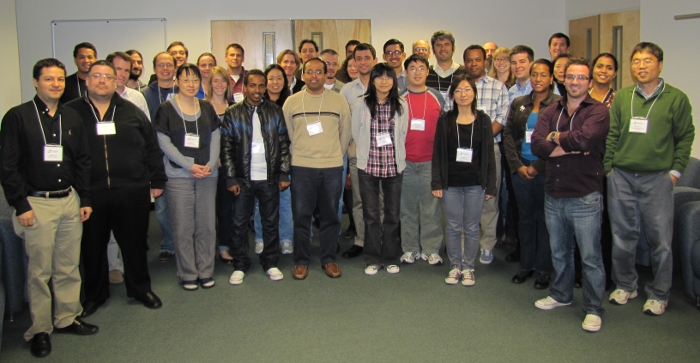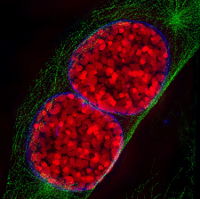| Description | Participants | Agenda | Talks | Products |
|---|
NIMBioS Investigative Workshop
Mathematical Modeling of Intracellular Movements (MMIMo)

Topic: Mathematical Modeling of Intracellular Movements (MMiMo)
Meeting dates: October 24-26, 2011
Organizers:
Vasileios Maroulas (Dept. of Mathematics, Univ. of Tennessee)
Andreas Nebenführ (Dept. of Biochemistry and Cellular and Molecular Biology, Univ. of Tennessee)
Ram Dixit (Dept. of Biology, Washington Univ. )
Panos Stinis (Dept. of Mathematics, Univ. of Minnesota)
Anja Geitmann (Dept. of Biological Sciences, Univ. of Montreal)
Objectives. Recent advances in live cell microscopy have resulted in a flood of time-lapse observations that reveal a high degree of motility inside cells. Quantitative analysis of these movements is necessary to gain a full understanding of intracellular dynamics and their regulation. This analysis is often hampered by the sheer complexity of the movements, the great number of objects to be tracked, and the diffraction limit of optical microscopes. At the same time, mathematical and statistical models have made significant progress in producing fast algorithms that reliably track multiple objects in space. In some cases, these models were successfully applied to cell biological data sets, but the full potential of a rigorous mathematical approach that can be employed across a wide range of biological processes has not been realized. MMiMo will bring together experts from cell biology as well as mathematics, statistics, computational science and physics to discuss current approaches and possible alternatives.
MMiMo’s first goal is to address to an interdisciplinary audience for the first time the major challenges for developing robust computational algorithms to reliably track intracellular dynamics. Some of the key challenges include:
- Describing the dynamics of the motion of intracellular objects.
- Estimating the parameters of the dynamics, e.g. the noise magnitude.
- Improving existing tracking algorithms.
- Developing algorithms to associate each object to a specific observation.
Overcoming of the mathematical and computational problems will lead to the MMiMo’s second aim to answer biological questions, such as:
- Which quantitative differences exist between organelle movements that rely on different cytoskeletal tracks or that employ different molecular motors?
- Can comprehensive analysis of all movements reveal a global regulation of intracellular dynamics?
- Do different organelles respond to different regulatory signals?
- How do rapid intracellular movements contribute to cell polarity?
We anticipate that the creation of a set of robust computational algorithms will enable cell biologists to address additional questions in a quantitative fashion.
Evaluation report (PDF)
 Summary Report. Experts in the research fields of intracellular transportation processes, statistical tracking, and biomathematical modeling made 20-minute presentations followed by a 10-minute discussion. Talks were followed by four parallel group discussion sessions wherein a number of specific suggestions were proposed, including identifying the needs of the community at large, such as image open source repositories and platforms for sharing mathematical and computational models. Future research directions include the denoising of microscopy raw data at each time instance, accurate description of the dynamics of particle motion, and tracking schemes which should be followed depending on the type of intracellular process.
Summary Report. Experts in the research fields of intracellular transportation processes, statistical tracking, and biomathematical modeling made 20-minute presentations followed by a 10-minute discussion. Talks were followed by four parallel group discussion sessions wherein a number of specific suggestions were proposed, including identifying the needs of the community at large, such as image open source repositories and platforms for sharing mathematical and computational models. Future research directions include the denoising of microscopy raw data at each time instance, accurate description of the dynamics of particle motion, and tracking schemes which should be followed depending on the type of intracellular process.
NIMBioS Investigative Workshops focus on broad topics or a set of related topics, summarizing/synthesizing the state of the art and identifying future directions. Workshops have up to 35 participants. Organizers and key invited researchers make up half the participants; the remaining participants are filled through open application from the scientific community. Open applicants selected to attend are notified by NIMBioS within two weeks of the application deadline. Investigative Workshops have the potential for leading to one or more future Working Groups. Individuals with a strong interest in the topic, including post-docs and graduate students, are encouraged to apply. If needed, NIMBioS can provide support (travel, meals, lodging) for Workshop attendees, whether from a non-profit or for-profit organization.
A goal of NIMBioS is to enhance the cadre of researchers capable of interdisciplinary efforts across mathematics and biology. As part of this goal, NIMBioS is committed to promoting diversity in all its activities. Diversity is considered in all its aspects, social and scientific, including gender, ethnicity, scientific field, career stage, geography and type of home institution. Questions regarding diversity issues should be directed to diversity@nimbios.org. You can read more about our Diversity Plan on our NIMBioS Policies web page. The NIMBioS building is fully handicapped accessible.
NIMBioS
1122 Volunteer Blvd., Suite 106
University of Tennessee
Knoxville,
TN 37996-3410
PH: (865) 974-9334
FAX: (865) 974-9461
Contact NIMBioS


